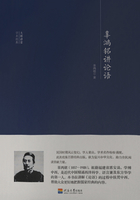But really, Mother, I am exceedingly in earnest in what I am going to write and have thought the whole matter over carefully before I have ventured a word on the subject. Wellesley is not a college. The buildings are beautiful, perfect almost; the rooms and their appointments delightful, most of the professors are all that could be desired, some of them are very fine indeed in their several departments, but all these delightful things are not the things that make a college. . . .
And, Oh! the experiments! It is enough to try the patience of a Job. l came here to take a college course, and not to dabble in a little of every insignificant thing that comes up. More than half of my time is taken up in writing essays, practicing elocution, trotting to chapel, and reading poetry with the teacher of English literature, and it seems to make no difference to Miss Howard and Mr. Durant whether the Latin, Greek and Mathematics are well learned or not. The result is that l do not have time to half learn my lessons. My real college work is unsatisfactory, poorly done, and so of course amounts to about nothing. l am not the only one that feels it, but every member of the freshman class has the same feeling, and not only the students but even the professors. You can have no idea of how these very professors have worked to have things different and have expostulated and expostulated with Mr. Durant, but all to no avail. He is as hard as a flint and his mind is made up of the most beautiful theories, but he is perfectly blind to facts.
He rules the college, from the amount of Latin we shall read to the kind of meat we shall have for dinner; he even went out into the kitchen the other day and told the cook not to waste so much butter in ****** the hash, for I heard him myself.
We must remember that the writer is a young girl, intolerant, as youth is always intolerant, and that she was writing only one month after the college had opened. It is not to be expected that she could understand the creative excitement under which the founder was laboring in those first years. We, who look back, can appreciate what it must have meant to a man of his imagination and intensity, to see his ideal coming true; naturally, he could not keep his hands off. And we must remember also that until his death Mr. Durant met the yearly deficit of the college. This gave him a peculiar claim to have his wishes carried out, whether in the classroom or in the kitchen.
Miss Stilwell continues:
I know there are a great many things to be taken into consideration. I know that the college is new and that all sorts of discouragements are to be expected, and that the best way is to bear them patiently and hope that all will come out right in the end. At the same time I am DETERMINED to have a certain sort of an education, and I must go where l can get it. . . . Oh! if I could only make you see it as we all feel it! It is such a bitter disappointment when I had looked forward for so long to going to college, to find the same narrowness and cramped feeling.--There is one other thing that Mrs. S. (the mother of one of the students) spoke of yesterday, which is very true I am sorry to say, and that is in regard to the religious influence. She said that she thought that Mr. Durant by driving the girls so, and continually harping on the subject, was losing all his influence and was doing just the opposite of what he intended. I know that with my room-mate and her set he is a constant source of ridicule and his exhortations and prayers are retailed in the most terrible way.
I have set my foot down on it and I will not allow anything of the sort done in my room, but l know that it is done elsewhere, and that every spark of religious interest is killed by the process. I have firmly made up my mind that it shall not affect me and l have succeeded in controlling myself this far.
On December 31, we find her writing: "My Greek is the only pleasant thing to which I can look forward, and I am quite sure good instruction awaits me there."















